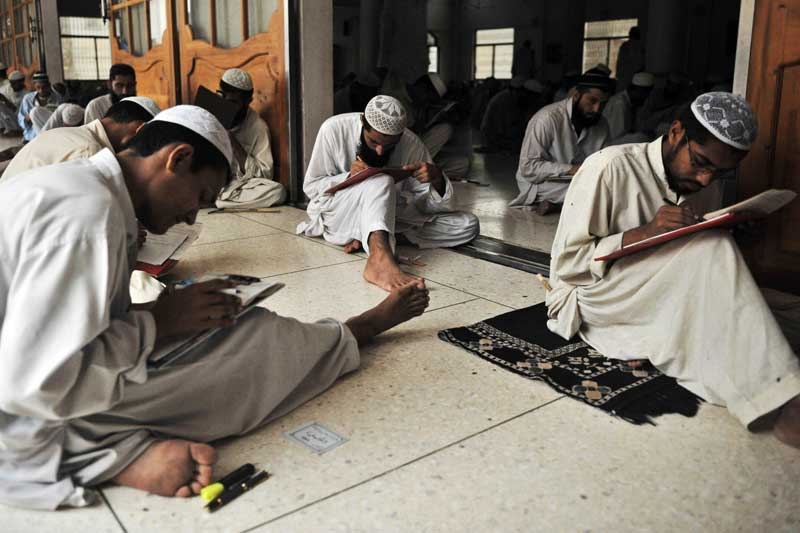Interview: Ayesha Haroon on Pakistan Education and Religious Intolerance

A new study by the U.S. government's commission on religious freedom (USCIRF) found that Pakistan's public schools and madrassas — privately run religious schools — fuel discrimination by casting Hindus, Christians and other religious minorities in a negative light.
"Teaching discrimination increases the likelihood that violent religious extremism in Pakistan will continue to grow, weakening religious freedom, national and regional stability, and global security," said Leonard Leo, chairman of the US Commission on International Religious Freedom, which released its report on Wednesday.
The study comes on the heels of the latest reports of the slaying of three Hindus in the Sindh province of Pakistan. Titled Connecting the Dots: Education and Religious Discrimination in Pakistan, the study involved the examination of social studies, Islamic studies and Urdu textbooks and pedagogical methods in Pakistan's public school system and its madrassa system, and the interviewing of teachers and students about their views on religious minorities.
Pakistani journalist Beena Sarwar termed the findings of the report “dire, but now new” on her website Journeys to Democracy. Sarwar traces the inculcation of religiously intolerant material to the start of the Afghan War by the American government (full report here).
Asia Blog reached out to journalist and Asia Society Associate Fellow Ayesha Haroon for her views on the issue. Haroon was part of a television panel discussion about education reform in Pakistan earlier this year, where she described the education gaps in Pakistan as "criminal."
According to the study, Pakistan's public schools teach from textbooks that have a strong Islamic orientation and frequently omit any mention of the religious minorities that live in the country. What in your opinion can and should be done to address the broader issue of religious intolerance that springs from lack of knowledge about the faith/lifestyles of groups outside of Islamic faith?
The government's education department has to rewrite history books — remove inaccuracies and discuss the role of all leaders (political, social, economic) and writers (poets, novelists, dramatists) regardless of gender, religion, etc. — but they need to consult with the right experts first about the content and then how to structure it into the curriculum. Curriculum writers are not content experts, necessarily. (Read: The Murder of History by K.K. Aziz.) If we are able to give the right content and tools to the students they can make their minds up themselves — and that would be fine. We don't need to go around molding their minds — the clerics will say their way of molding is better and the liberals will say they are better. Propaganda by anyone remains propaganda. We need to focus on education. For instance, if the students read about the role of Bhagat Singh — a Sikh freedom fighter — and Raja Ranjeet Singh (a Sikh ruler of Punjab), they will automatically stop thinking one religion is better than the other.
Are schools alone the answer or are there other areas where the government should be focusing, in order to, attain the goal of removing religious discrimination/intolerance?
Firstly, schools are very important. We need to make schools a place of inquiry and questioning and critical thinking — so that when they hear prejudice, they can question it. Secondly, media plays a role. Media can stop sensationalising everything. We can have better dramas and soaps penned by good authors not those running after all that is venal in the society. Very very importantly, electronic media has to rein in their anchors — every proselytizing, unread, confused and ratings-hungry person is now an anchor on some show or the other. They give wrong information to people, ask terrible questions, and get away with it. First it was only limited to the anchors of religious programs and then even so-called news show hosts started the same. Read about Mehr Bokhari and the questions she asked Salman Taseer — who was later gunned down. Thirdly, public spaces for discussion are need such as libraries, cultural centers, community centres, etc.
Are there any steps being taken in Pakistan by the government to change the content of curriculum to be more accommodating towards religious minorities?
The governments keep saying that they will and perhaps there is some tweaking of curriculum also but not much — also because there is a perception amongst public that curriculum changes are being forced by the West. There needs to be a more local based effort for this.
Why is there such a difference between private and public education system standards?
Those who make and implement policies do not send their children to [the] public education system, hence they have no interest in making the right polices or implementing them.
What are the ground realities at this point as regards proper education being provided to children in Pakistan?
Ground realities are not impressive — Punjab is doing some work, the rest of the provinces do not appear to have education as a priority. That said, Punjab needs a huge amount of funds and expertise to improve the existing schools and also set up new ones. Transport costs alone deter a lot of families from sending their children to schools even in a city such as Lahore.


